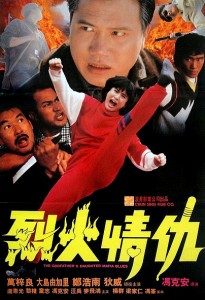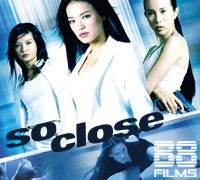Director: Fung Hak On
Cast: Mark Cheng Ho Nam, Yukari Oshima, Alex Man Chi Leung, Dick Wei, Ken Lo, Wong Yu, Leung Kar Yan, Tai Bo, Anthony Carpio, Chan Daat Gong, Benny Lai Keung Kuen, Chow Kong, Chu Tau, Mark King, Foo Wang Tat
Running Time: 91 min.
By Paul Bramhall
The Godfather’s Daughter Mafia Blues, besides having a title that resembles a Bob Dylan song gone wrong, rarely seems to get mentioned when fans discuss early 90’s Hong Kong action cinema, yet at the same time also manages to be a title that everyone has heard of. In many ways it could well be down to the fact that it’s a difficult production to categorize. The few reviews that are floating around on the net reference it as a ‘Girls with Guns’ flick, seemingly based on nothing more than it featuring Yukari Oshima and it being from 1991, however once watched it becomes apparent it has little in common with said genre. A better description would be to call it a Triad thriller, which just so happens to have some stellar martial arts talent in front of the camera, who duly oblige in showing that talent off at various points throughout the runtime.
The man in the director’s chair is the late great Fung Hak-On, recognizable from several kung fu classics, most notably as the villain from Sammo Hung’s Warriors Two. Hak-On may have been more well known for his roles in many of the most popular kung fu movies of the golden era, however The Godfather’s Daughter Mafia Blues was actually the fourth (and last) time for him to direct a movie, so he was certainly no stranger to being behind the camera.
Proceedings open with an introduction to a pair of fish farmers, played by Mark Cheng and Benny Lai. Cheng was marketed as the next big leading man by Cinema City throughout the mid-80’s, but for some reason he never really clicked with audiences, and by the early 90’s was mostly starring in lower budgeted productions such as this one. His presence in The Godfather’s Daughter Mafia Blues could also be explained by the fact he married Yukari Oshima shortly before it started filming, so the pair came as a package deal (they’d also appear together in Win Them All, Kickboxer’s Tears, and Hard to Kill). Lai on the other hand is best known as the mute adversary that Jackie Chan faces off against in the finale of Police Story 2. He spent part of his career as a member of Chan’s Stuntman Group, and has a filmography that mostly consists of parts as a thug or gang member, so this production was a rare opportunity for him to play a significant role.
A chance encounter with some gangsters results in them crossing paths with a Triad leader, played by Alex Man, who takes them under his wing and puts them to work in one of his hostess bars. Man has plenty of issues of his own though. His Triad leader is an honourable and old-school guy, who’ll do anything to keep the peace (it’s quite possible Gareth Evans had his performance in mind for Tio Pakusadewo’s role in The Raid 2), however when his Japanese counterpart dies, the latter’s aggressively ambitious son wants to buy out the business from under him. The son is played by super kicker Ken Lo, perhaps most famous for being Jackie Chan’s bodyguard from 1980 – 2010 (not to mention their legendary fight to close out Drunken Master II), who’s ably assisted by his head henchman, played by the director himself, Fung Hak-On, who also takes on action choreography duties.
For those reading that want to check out The Godfather’s Daughter Mafia Blues as Yukari Oshima fans, you’re probably concerned that she hasn’t even been mentioned yet. Actually, Oshima does have a large part, which as the title suggests is that of Man’s daughter. However she doesn’t appear until just over 20 minutes in (she’s been in Japan studying karate), and to see her in action you’ll have to wait until the 50 minute mark. However this isn’t detrimental to the movie at all, and her character fits in perfectly with the events that are taking place. As the daughter of a Triad leader, her role as a young and playful martial arts fanatic is very different from the no-nonsense characters she often embodies, but when she finds out that Lo is trying to undermine her father, she also knows how to get down to business.
Indeed rather than really having a main character so to speak, The Godfather’s Daughter Mafia Blues comes across very much like an ensemble piece. All of the main players get plenty of screen time for us to get to know their characters, as does Dick Wei, who plays the long serving enforcer to Man’s Triad leader. Much like Benny Lai, Wei also spent much of his career in one dimensional villain roles, and was happy for his feet to do the talking for him, which always did so very efficiently. However his role here is one that has a welcome depth to it, and without going into spoiler territory, it’s his decision that ultimately sends the Triads and Yakuza on the path to an inevitable confrontation. I’m not sure if it was intentional, but considering the role gave him a rare chance to show off some acting chops, it’s especially ironic that his character gets a line where he asks, “I act well don’t I?”
When it comes to the business of Triad and Yakuza rivalries, the plot certainly doesn’t shy away from getting nasty. In one particular scene, Lo attempts to lure the Madame’s away from Man’s hostess bar to work in his instead, with the promise of a higher wage. However when one of them insists on being loyal to Man, Lo pays a young teenager who wants to be a gangster to throw a cup of acid in her face. Scenes like this ensure that the story is taken seriously, and it never digresses into comedy or other such hijinks, that HK cinema of the era is frequently guilty of doing.
The action itself is one of those rare occasions in which it serves to further the story, rather than just being stand-alone set pieces. Cheng had the moves when it came to screen fighting, even though his career ultimately didn’t follow a path where he’d get to use them that much, but here he gets ample opportunity to break them out. The choreography is a unique mix of the hard hitting kickboxing style, which would become synonymous with 80’s – early 90’s modern day HK action flicks, blended with some occasional old-school flourishes, such as a shape thrown here and there. A highlight sees Oshima taking on both Ken Lo, Fung Hak-On, and a group of their lackeys single handedly in a gym, which incorporates plenty of prop usage reminiscent of Jackie Chan.
Eventually proceedings build to a satisfying finale that sees most of the last 15 minutes being taken up with action. There’s some satisfying vehicle work on display, of which there are a couple of impact shots that’ll make you question how the stuntman on the receiving end of them survived. Events culminate with Dick Wei having to face off against two opponents, and a closing bout that sees Cheng and Oshima teaming up to take on Lo and Hak-On respectively. It’s a great fight, even if it’s a tier below the best work of all involved, however considering the context it takes place in and the budget that was being worked with, it undeniably delivers. Throw in plenty of smashed glass tables and collateral damage, with a suitably gruesome finishing move, and for fans of both old school and new wave action, The Godfather’s Daughter Mafia Blues arguably exceeds the sum of its parts.
All things considered, Hak-On’s last movie in the directors chair captures a moment in Hong Kong cinema that we’ll likely never get back. Sure, movies can still be made about Triads and Yakuza facing off against each other, but had the movie been made today, it would likely be at least 10 minutes longer, as we’d no doubt have to watch the police arrive on scene and arrest the surviving members. Because China needs to remind us that crime doesn’t pay. As it is, The Godfather’s Daughter Mafia Blues doesn’t have a single police character in it, everyone is either a Triad or a Yakuza, and what goes down takes place between them and no one else. While it’s not perfect, Hak-On has directed a coherent and engaging tale of gang rivalries, which doesn’t feel the need to pad its runtime with such distractions as comedy and romance, and that’s to be applauded. The fact that we get a healthy dose of HK style action on top, is merely the icing on the cake.
Paul Bramhall’s Rating: 7/10





This sounds AWESOME!!!! And I bet I’ve skipped past it numerous times at used stores simply because the title seems so campy. Argh!!!! It’s a lost treasure, and I want to get my hands on this so bad! Killer review, dude.
Are there other names for this film?
Hi KamenZo. No, other than the original Chinese title, I don’t believe this one has ever gone under any other aliases.